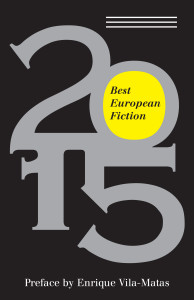 Vedrana Rudan, ‘My Granddaughter’s Name Is Anita’
Vedrana Rudan, ‘My Granddaughter’s Name Is Anita’
Translated from the Croatian by Ellen Elias-Bursać
A woman lies in bed, unmoved by the attentions of her husband. He tries to pleasure her by stimulating different parts of her body, but none of it works; instead, the woman dreams about things she does enjoy – mostly shopping and clothes:
My head is in the closet. I am sniffing my blouses. I count them. Forty-three colorful babes watch me merrily. White, green, red, pink, pale green, the color of water, black. I even have one the color of dirt. A big, dull, dark-brown blouse. I don’t dare take it out of the closet because it is a gift from my husband. When he gave it to me, I thought, God, you know nothing about me. A dark-brown blouse. A mound of dirt by a freshly dug grave.
Ellen Elias-Bursać’s translation is full of such choppy rhythms that evoke the narrator’s restlessness, but also her raw emotions – desire and repulsion. Her feelings about clothes may be genuine, or magnified by the dream state; either way, they’re a sign that she’s uncertain about her life and herself. She clings on to material things that aren’t actually real, but shies away from sensations that are.
The title of Vedrana Rudan’s story stands out because it’s a seemingly throwaway line that has nothing much to do with the main story. But it opens up an entirely new context in which to view the narrator: as a grandmother, someone with ties beyond the immediate sphere of her marriage (which is all we really see in Rudan’s tale). The story illustrates that even the simplest-seeming moments can reveal emotional complexity, and may show just one facet of a life among many.
Răzvan Petrescu, ‘G-text’
Translated from the Romanian by Alistair Ian Blyth
Well, this must have been fun/interesting/challenging/frustrating to translate: a monologue full of long, rambling sentences, with plenty of G-sounds. For example:
[…]I hated the open air grills, and the claws of the griffon that fluttered above us on odd-numbered days, I hated the glaring lies, the gladioli, the unquestioned chacun à son gout that was always questioned, but not Simon and Garfunkel, and Gogol, and Dizzy Gillespie, and Sartre’s gagging in Nausea was crushingly minor compared with the apocalyptic work of my nausea.
It’s a fabulous piece of translation by Alistair Ian Blyth. The Gs wax and wane, but the voice of Răzvan Petrescu’s narrator is always there: angry at the past and Ceaucescu’s regime – the music that was banned, the trams that didn’t run, and much more besides – a voice that feels as though it has been waiting for a chance to speak, and seizes the moment with an unstoppable torrent of words
Recent Comments